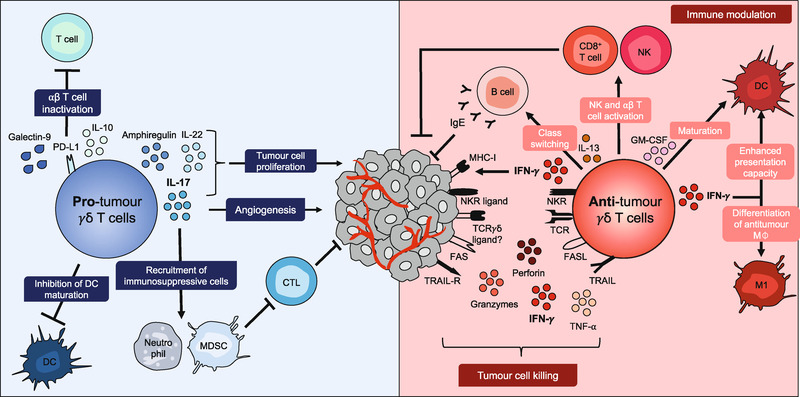Figure 2.

Pleiotropic functions of γδ T cells in the TME. Pro‐tumoural roles of γδ T cells (left panel in blue) include the production of IL‐17 which stimulates tumor cell proliferation, induces angiogenesis, and recruits immunosuppressive cells like myeloid‐derived suppressive cells (MDSC) that inhibit cytotoxic T lymphocytes (CTL). γδ T cells can also inhibit DC maturation and exert IL‐17‐independent pro‐tumor roles, via galectin‐9, programmed cell death protein 1 ligand 1 (PDL‐1) or IL‐10, which inhibit ⍺β T cell responses; or through production of amphiregulin or IL‐22 that promote tumour cell proliferation. Antitumoral roles of γδ T cells (right panel in red), activated through the T cell receptor (TCR) and NK cell receptors (NKRs) to kill tumor cells upon expression of perforin and granzymes, FAS ligand (FASL) and tumor necrosis factor‐related apoptosis‐inducing ligand (TRAIL), as well as the cytokines tumor necrosis factor ⍺ (TNF‐⍺) and IFN‐γ. IFN‐γ upregulates MHC class I expression on tumor cells, which enhances their recognition by cytotoxic T lymphocytes. IFN‐γ also induces the differentiation of antitumor macrophages (M) and enhances the presentation capacity of antigen‐presenting cells. Additionally, γδ T cells promote the maturation of DCs via secretion of GM‐CSF; promote activation of CD8+ T cells; increase cytotoxicity of NK cells via CD137L expression; and, through IL‐13 secretion, induce antibody class switching in B cells to autoreactive antitumor IgE.
